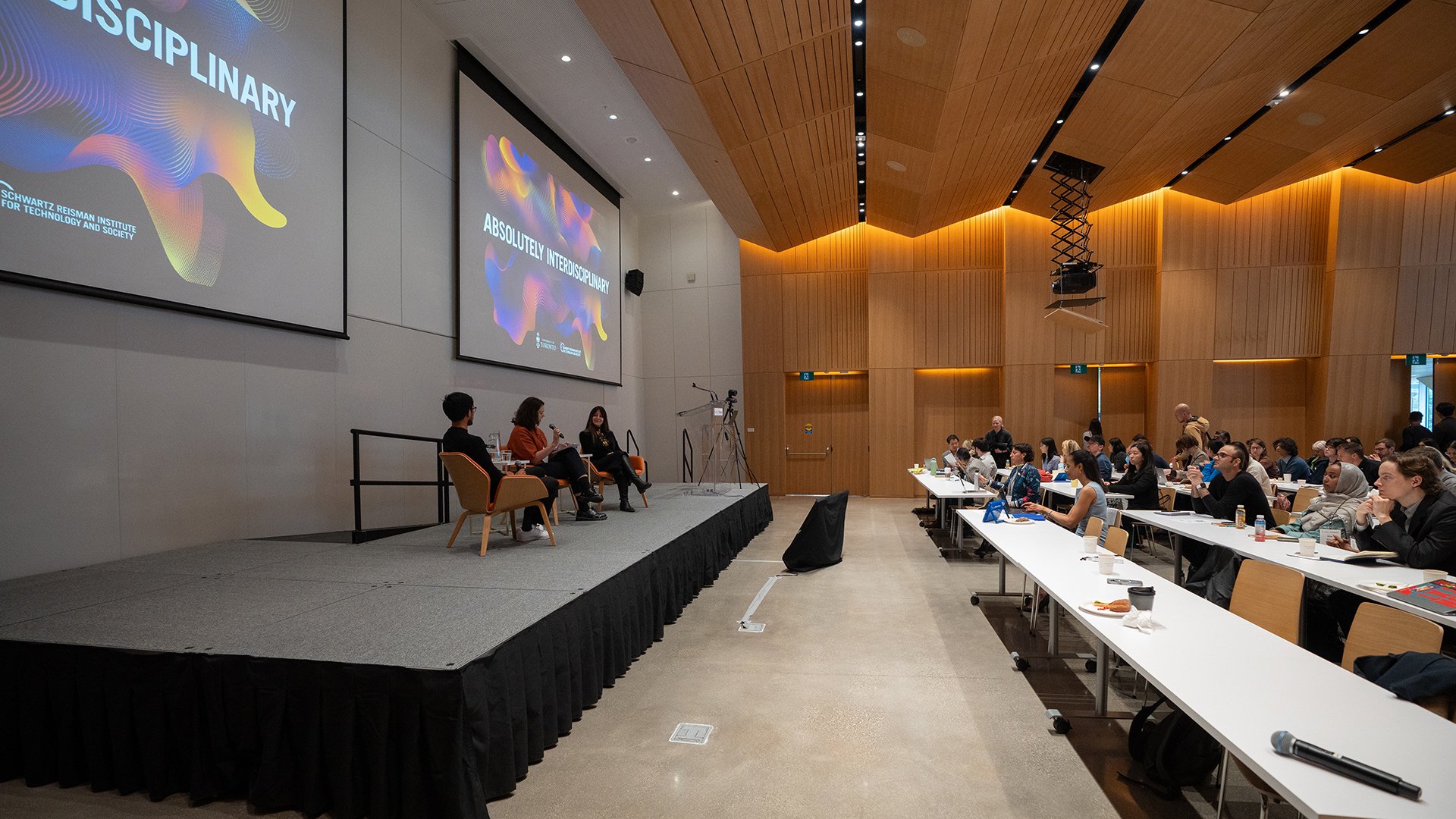Schwartz Reisman Institute welcomes 2023 fellowship recipients
The Schwartz Reisman Institute for Technology and Society is proud to announce its 2023 cohort of fellowship recipients, welcoming four new faculty fellows and sixteen new graduate fellows from across the University of Toronto. From computer science, medical biophysics, and applied engineering to architecture, psychology, and philosophy, Schwartz Reisman fellowships support interdisciplinary research projects that build new approaches to examine the complex relations between technology and society.
The Schwartz Reisman Institute for Technology and Society (SRI) is pleased to announce its 2023 fellowship recipients, with the appointment of four faculty fellows and 16 graduate fellows from across the University of Toronto’s research community.
With research interests ranging from computer science, medical biophysics, and applied engineering to architecture, psychology, and philosophy, we look forward to welcoming our fellows’ diverse spectrum of research expertise to the Institute.
Schwartz Reisman fellowships support interdisciplinary research projects that examine the complex relations between technology and society, build new connections between existing fields, and develop innovative applications that contribute to the use of AI for social good.
The 2023 fellowships will enable cutting-edge research that will further SRI’s mission to ensure that new technologies improve life for everyone, and support the expansion of the SRI community through engagement in the Institute’s events and public outreach. Faculty fellows will serve a two-year term, while graduate fellows will serve a one-year term.
From left to right: University of Toronto faculty members William Cunningham, Daniela Galatro, Shion Guha, and Avery Slater are the recipients of 2023–25 Schwartz Reisman Faculty Fellowships.
2023–25 Schwartz Reisman faculty fellows
William Cunningham, professor, Department of Psychology
Daniela Galatro, assistant professor, Department of Chemical Engineering and Applied Chemistry
Shion Guha, assistant professor, Faculty of Information and Department of Computer Science
Avery Slater, assistant professor, Department of English
William Cunningham is a cognitive scientist and professor in U of T’s Department of Psychology, with a cross-appointment as a professor of marketing at the Rotman School of Management. His work combines deep learning and reinforcement learning (RL) techniques with neuroscience and behavioural science to build computational models of social cognition and behaviour. Cunningham’s recent work in understanding social behaviour in multi-agent RL environments will be featured in a session at the Schwartz Reisman Institute’s upcoming conference, Absolutely Interdisciplinary.
Daniela Galatro is an assistant professor in U of T’s Department of Chemical Engineering and Applied Chemistry and an engineer with more than 20 years of experience in the petroleum industry. Her fellowship project will use machine learning (ML) techniques to consolidate engineering methods with Indigenous approaches to investigating and reducing the effects of environmental contaminants in Fort William First Nation, a geographic area with a statistically higher than average occurrence of cancer among its residents. In her recent research, Galatro developed hybrid approaches utilizing ML simulations and optimization algorithms for modelling landfills and predicting degradation in lithium-ion batteries.
Shion Guha is an assistant professor in U of T’s Faculty of Information, with a cross-appointment in the Department of Computer Science. His research interests encompass human-computer interaction, data science, and public policy, including the development of the nascent field of human-centred data science. Guha’s work aims to understand how algorithmic decision-making processes are designed, implemented, and evaluated in public services such as child welfare and criminal justice. His current research combines critical, interpretive methodologies with computational approaches through a human-centered design lens to improve the relationship between algorithms and society. Guha will be presenting at the Schwartz Reisman Institute’s upcoming Toronto Public Tech Workshop.
Avery Slater is an assistant professor in U of T’s Department of English whose research investigates the re-conceptualization of human and nonhuman forms of language following the rise of information and computational technologies. Slater’s fellowship will support a book project that explores how mid-20th-century poets revise and reinvent modernist theories of poetic process in response to emerging technologies of language such as computation, artificial intelligence, machine translation, and information theory. Slater will moderate a session on AI and creativity at the Schwartz Reisman Institute’s upcoming conference, Absolutely Interdisciplinary.
From left to right, top to bottom: University of Toronto graduate students Taneea S. Agrawaal, Michael Beauvais, Hiu-Fung Chung, Michael Colacci, Jamie Duncan, Alice Huang, Blake Lee-Whiting, Wenxi Liao, Kelly McConvey, Felix Menze, Ramaravind Kommiya Mothilal, Jo-Ann Osei-Twum, Silviu Pitis, Han Qiao, Emily Schwartzman, and Michael Zhang are the recipients of 2023–24 Schwartz Reisman Graduate Fellowships.
2023–24 Schwartz Reisman graduate fellows
Taneea S. Agrawaal, Department of Computer Science
Michael Beauvais, Faculty of Law
Hiu-Fung Chung, Faculty of Information
Michael Colacci, Institute of Health Policy, Management and Evaluation
Jamie Duncan, Centre for Criminology and Sociolegal Studies
Alice Huang, Department of Philosophy
Blake Lee-Whiting, Department of Political Science
Wenxi Liao, Institute of Forestry and Conservation
Kelly McConvey, Faculty of Information
Felix Menze, Department of Medical Biophysics
Ramaravind Kommiya Mothilal, Faculty of Information
Jo-Ann Osei-Twum, Dalla Lana School of Public Health
Silviu Pitis, Department of Computer Science
Han Qiao, Faculty of Information
Emily Schwartzman, Department of Psychology
Michael Zhang, Department of Computer Science
Taneea S. Agrawaal is a PhD student in the Department of Computer Science with a specialization in environmental studies. Her work focuses on climate data and current technological approaches—especially human-computer interaction—to addressing climate change. Her interdisciplinary work touches upon climate adaptation, civic technologies, data and data infrastructures, and social justice.
Michael Beauvais is a PhD candidate in the Faculty of Law specializing in data protection, children's studies, and surveillance studies. His research looks at information-communication technologies, data protection law, and adolescent-parent privacy in law to develop legal frameworks that support digital privacy for youth.
Hiu-Fung Chung is a PhD student in the Faculty of Information where his research interests include labour and work, inequality, digital capitalism, and political sociology in an East Asian context. His current work explores how the uses of artificial intelligence influence professional fields in Hong Kong with a focus on the construction of disadvantages and privileges and the relationship between AI, work, and inequalities.
Michael Colacci is a PhD candidate in the Institute of Health Policy, Management and Evaluation. His research focuses on developing and evaluating machine learning models within healthcare, with a focus on identifying and correcting for bias on sociodemographic factors.
Jamie Duncan is a PhD candidate in the Centre for Criminology and Sociolegal Studies, where he studies information policy and technology governance, with a focus on security, migration, and policing. His research blends computational and qualitative methods to understand how state officials, corporate suppliers, and advocacy organizations influence the adoption of new technologies for border security.
Alice Huang is a PhD candidate in the Department of Philosophy where she specializes in social and computational epistemology, belief formation, multi-agent interactions, and collective decision-making. Her research uses computational models to investigate the effects of social factors such as diversity on the interactions within epistemic groups and the generation of knowledge, with applications for informing policy design in the wake of rapid technological developments.
Blake Lee-Whiting is a PhD candidate in the Department of Political Science specializing in the politics of technology in Canada. His research investigates public opinion about automation and artificial intelligence and its effects on our political system. In particular, he tests theories related to public-facing automation, including theories related to technological adoption, policy preferences, and political boycott.
Wenxi Liao is a PhD candidate in the Institute of Forestry and Conservation where her research incorporates environmental science, engineering, geography, ecology, and hydrology to assess green infrastructure and improve green roof performance. Her current research aims to assess plant performance on green roofs on a city scale in the long term and develop an AI-based tool for cities to monitor green roof performance.
Kelly McConvey is a PhD student in the Faculty of Information who specializes in human-centered data science, AI and public policy, and algorithmic bias. Her current research explores algorithmic decision-making and digital surveillance in higher education, including the ways in which student learning analytics data is generated, transmitted, shared, and used for decision-making. McConvey will be presenting at the Schwartz Reisman Institute’s upcoming Toronto Public Tech Workshop on a recent paper co-authored with SRI Faculty Fellow Shion Guha.
Felix Menze is a PhD student in the Department of Medical Biophysics whose research focuses on simulated driving, public safety, and cognitive impairment. Combining neuroimaging and virtual reality to test how age and societal factors impact our ability to use new technologies, he is currently working on improving understanding of neural activity during car-driving tasks in order to increase driving safety for elderly drivers.
Ramaravind Kommiya Mothilal is a PhD student in the Faculty of Information. His research is broadly situated in fairness in sociotechnical systems and developing technologies to help these systems produce beneficial outcomes for society.
Jo-Ann Osei-Twum is a PhD student in the Dalla Lana School of Public Health where she specializes in epidemiology with a focus on equitable and effective applications of artificial intelligence and data science for population health.
Silviu Pitis is a PhD candidate in the Department of Computer Science where his research focuses on the design, representation, and selection of goals, rewards, and abstractions for artificial agents, especially reinforcement learning agents. His current work asks: What is the right objective for general purpose artificial agents to pursue and how should we represent it?
Han Qiao is a PhD student in the Faculty of Information where she specializes in civic technology, sensemaking, data visualization, feminist data science, design justice, and participatory design. Her research asks what role can be played by data technology in the work of community advocacy, and seeks to shift the design of urban systems from data-focused to human-centered with a view toward amplifying marginalized voices.
Emily Schwartzman is a PhD student in the Department of Psychology, where her research explores social perception, gender stereotypes, and how humans perceive language-processing AI now that this technology closely emulates patterns of human language and behaviour.
Michael Zhang is a PhD candidate in the Department of Computer Science specializing in neural network optimization. His research investigates how we might develop current and future AI models that are more likely to be socially positive, by leveraging neural net training dynamics to develop built-in safety features.










